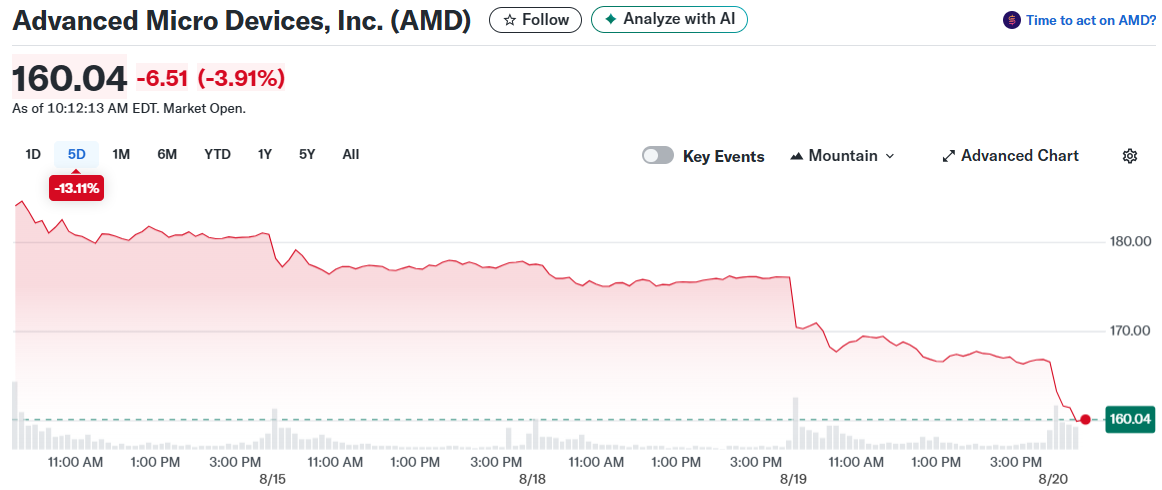TLDR
- AMD stock dropped over 5% on Tuesday as investors reacted to SoftBank’s $2 billion investment in rival Intel
- The selloff followed AMD’s disappointing Q2 earnings last week, particularly weak AI data center division performance
- AMD shares broke below the 20-day moving average for the first time since April, testing $160 support
- Intel received $23 per share valuation from SoftBank, making it the fifth-largest investor with 2% ownership
- Competition intensifies as Nvidia accelerates development and Arm Holdings moves to in-house chip production
AMD stock took another hit on Tuesday, falling more than 5% as investors processed news of a major investment into the company’s longtime rival. The decline extended a rough patch that began with disappointing quarterly earnings last week.

SoftBank announced after Monday’s market close that it would invest $2 billion in Intel common stock. The deal values Intel shares at $23 each, giving the Japanese conglomerate roughly 2% ownership. This makes SoftBank Intel’s fifth-largest investor overall.
Intel stock jumped nearly 7% following the announcement. The stark contrast left AMD shareholders feeling overlooked, contributing to Tuesday’s 5.49% decline in AMD shares.
The latest drop came after AMD already faced pressure from its Q2 earnings report. Revenue edged slightly above estimates, but the company’s AI-driven data center division underperformed expectations. This key growth area disappointed investors who had pushed the stock higher throughout the spring.
AMD initially recovered from the earnings selloff with a gap higher opening. Shares briefly touched $186.65 before momentum faded and the stock reversed course by week’s end.
Tuesday’s decline brought AMD down to test the $160 level. More concerning for bulls, the stock fell below its 20-day simple moving average for the first time since April.
Technical Breakdown Signals Trouble
This technical breakdown suggests AMD’s three-month rally may be losing steam. The stock had climbed steadily since April before hitting recent roadblocks.
The semiconductor sector faces mounting competitive pressures. Nvidia has accelerated chip development to defend its Chinese market position while advancing its Rubin processor line. Arm Holdings shifted toward in-house chipmaking to secure stronger supply chain positioning.
These moves put additional pressure on AMD’s market share. The company must navigate increasing competition while addressing its own execution challenges.
Goldman Sachs analyst James Schneider maintains optimism about AMD’s fundamentals. He noted the company’s leading position in data center GPUs.
However, Schneider warned that sky-high investor expectations could cap near-term upside. Scaling constraints also present execution risks that could hamper growth.
Geopolitical Risks Loom Large
His projections suggest AMD’s data center GPU revenue might reach $10-11 billion by 2026. But he stressed that execution risks remain substantial given the competitive landscape.
China accounts for roughly 24% of AMD’s total revenue. This creates exposure to geopolitical tensions between Washington and Beijing.
U.S. restrictions on advanced chip exports pose ongoing threats to AMD’s business. Supply chain realignments to reduce China dependence may increase costs and slow growth.
The SoftBank investment in Intel highlights how major tech investors are positioning for the sector’s future. AMD investors clearly felt left out of this particular deal.
SoftBank’s investment reflects broader efforts to strengthen U.S. manufacturing capabilities. The Trump administration has made expanding domestic chip production a key priority.
Intel had been struggling more than AMD recently, making it a logical target for investment. The $2 billion injection provides Intel with fresh capital to compete.
The deal doesn’t change AMD’s fundamental outlook, but it does shift competitive dynamics. Intel now has additional resources to challenge AMD’s market position.
AMD’s recent technical breakdown below the 20-day moving average signals potential further weakness. The stock’s failure to hold this key support level concerns technical analysts.
SoftBank agreed to invest $2 billion in Intel stock at $23 per share, making it the fifth-largest institutional investor with 2% ownership stake.






